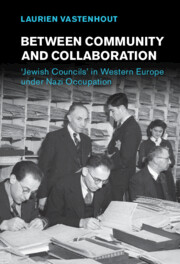Book contents
- Between Community and Collaboration
- Studies in the Social and Cultural History of Modern Warfare
- Between Community and Collaboration
- Copyright page
- Dedication
- Contents
- Illustrations
- Preface
- Abbreviations
- Introduction
- 1 Disrupted Communities?
- 2 Institutional Rivalry and Improvisation
- 3 Leadership of the ‘Councils’
- 4 Optimism and Frustration
- 5 Between Legality and Illegality
- Epilogue
- Bibliography
- Index
3 - Leadership of the ‘Councils’
Continuation or Discontinuation with Pre-war Structures?
Published online by Cambridge University Press: 15 September 2022
- Between Community and Collaboration
- Studies in the Social and Cultural History of Modern Warfare
- Between Community and Collaboration
- Copyright page
- Dedication
- Contents
- Illustrations
- Preface
- Abbreviations
- Introduction
- 1 Disrupted Communities?
- 2 Institutional Rivalry and Improvisation
- 3 Leadership of the ‘Councils’
- 4 Optimism and Frustration
- 5 Between Legality and Illegality
- Epilogue
- Bibliography
- Index
Summary
This chapter expands upon Chapter 1 by examining whether those who were appointed at the helm of the ‘Jewish Councils’ constituted a continuation or discontinuation of pre-war structures. It sets the conduct of the organisations’ leaders in the pre-war and wartime social contexts, and demonstrates the wide social variation in the organisations’ central board membership. The Germans were keen to appoint Jews who already held a leading role in the communities. This proved more difficult in Belgium and France than in the Netherlands. It is argued that the relatively well-integrated pre-war position of the Dutch Council leadership in combination with a relatively stable Jewish community resulted in a more confident self-perception of their role compared with that of their Belgian and French counterparts. In addition to examining how far Jewish leaders (felt they) represented the Jewish communities, this chapter also contextualises their acceptance by these communities. The Jewish leaders’ confidence, or lack thereof, determined their choices at later stages. These different attitudes help to explain organisational divergences, including why some of the leaders in Belgium and France were replaced, while the Dutch leadership remained in place until the Jewish Council was dismantled in 1943.
Keywords
- Type
- Chapter
- Information
- Between Community and Collaboration'Jewish Councils' in Western Europe under Nazi Occupation, pp. 92 - 141Publisher: Cambridge University PressPrint publication year: 2022

